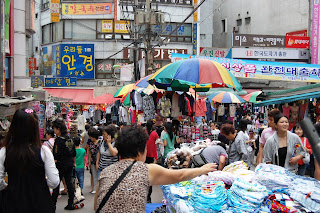Alison might weigh in on this at a later date, but these are my thoughts.
So, we have been here almost four months now, kind of hard to believe we are one third of the way through our contracts. I have been doing a lot of thinking about what it actually means to be a foreigner. I don't always feel like a foreigner here. During the week when I simply go to school and run in the park everything seems normal, even when I go to my regular restaurants and convenience stores. But anywhere new is completely different. I wonder what the native citizens of Korea think about when they see me. It is a safe assumption that if you see a foreigner in Seoul, they are probably an english teacher, especially if they are around my age. It might even be a stereotype, not necessarily negative though. In attempting to figure out what they think when they see me I thought about my thoughts when I see a foreigner back in the states. Here is what I came up with.
Living in Texas I would see or interact with hispanics everyday, especially working in restaurants and areas where there is construction. I think it would be a safe assumption that these men and women are here seeking better opportunities than what they could find in the their native country, whether they crossed the border last week, or their grandparents did 50 years ago. What they came for was something better than what they could get in their native land. I have that in common with them. Our skill sets are different, but our objective is the same. With my low-demand and low pay sociology degree, finding something comparable to what I have here is very slim. My benefits here include a competitive salary(when you figure that housing is paid for), full health insurance coverage for roughly $50/month, not to mention that a doctors visit will set me back a mere $7.00 and 3 days worth of prescriptions is usually less than $5.00, and I am actually putting money away in the back, not merely scraping by. While I am sending my money home to build a base savings for a marriage and family, hispanics that immigrate into the states are seeking money to send home to mexico to support their family there. I never thought about why hispanics came to the states this much before, I always knew they were seeking better opportunities, but I feel like I can empathize with them slightly as well. I have heard people say of hispanics "why don't they learn the language?" to this my response would now be "I work a mere 30 hours every week and have a hard time trying to find time to learn the language. I have learned the phrases that I should know to get by, and I am going to keep trying to learn more, but it is hard finding the time. For many of the men and women who come into the states, they are learning more of the language than I have here, and they often work 2 or 3 jobs to stay afloat."
The state does not make it as easy for foreigners as other countries do. Granted english is more widely spoken throughout the world. But here in korea, all subways signs and traffic signs are in korean, english, and japanese, and sometimes chinese. Where korea goes the extra step to help foreigners, the states do very little to nothing at all. I will say that the in the state of texas there has been change, all state forms can found in spanish, and most companies have spanish options for calls to customer service.
When I am out in public, I do my best to not embarass my country by adhering to all the customs of this country. I believe that most foreigners in the US have the same attitude, so I would encourage you to think about how welcoming your attitude is towards them. I can tell when someone here is not quite sure why I am there, or think I am out of place, and it's just as easy to tell when someone just accepts you and respects you for being brave and living in a foreign country. Let me know your thoughts on this.













 I also shaved off my beard this past week. It was beginning to get warm and muggy here, and it was just getting to be a nuisance, so i shaved it off in phases and sculpted it into to nasty facial hair.
I also shaved off my beard this past week. It was beginning to get warm and muggy here, and it was just getting to be a nuisance, so i shaved it off in phases and sculpted it into to nasty facial hair. 